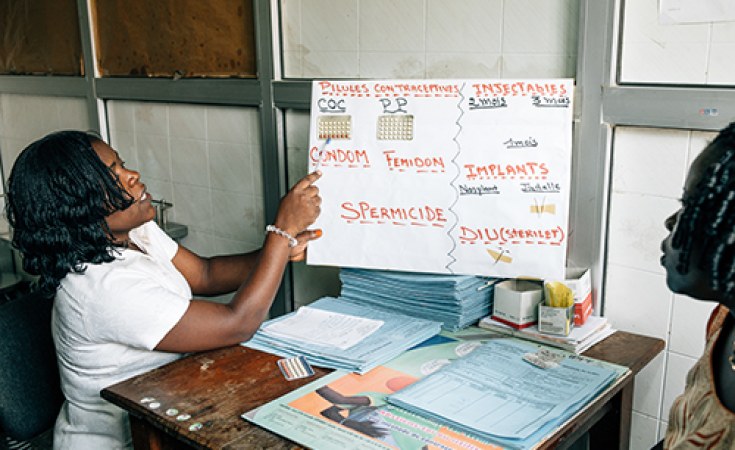Bolgatanga, Ghana — The COVID-19 pandemic is setting back important progress on women's health across Africa. There are many reasons for this, including lockdown restrictions which are keeping women at home, concerns about catching the virus, and the closure of women's health services. These problems are not simple ones, but they to be acknowledged and addressed.
In my own country, Ghana, where my organisation runs safe abortion and family planning services in the north of the country, we saw a sharp drop in the number of women accessing our services from April to August 2020, compared to the same period last year. Cervical cancer screening has also been suspended or postponed, because nurses and midwives are worried about keeping safe during screening. I have heard this directly from those I work with. Indeed, across Africa, the majority of health workers are women, putting them at extra risk of Covid-19. On the other hand, women are also worried about the risk of infection if they access screening and other services, especially when they do not have a mask.
In many areas, Covid-19 has reduced the provision of vital services for women. Downturns are reported in the numbers of women seeking antenatal and postnatal services - care before and after childbirth - while public health education and outreach programmes have been restricted because of limits on public gatherings and meetings.
Covid poses specific health threats to women, particularly in vulnerable communities.
Ensuring that women have access to quality sexual and reproductive health services is central to their ability to make informed choices and decisions about their lives, and every effort must be made to make this happen. Services for women's health are still in their infancy in many parts of the continent. Lack of information is a big problem.
Some may see issues such as safe abortion and cervical cancer screening as a lower priority in the midst of a global health crisis, but women are half of the population, and their health has a direct impact on their children and wider families. Healthy mothers have healthy children who are more likely to thrive, go to school and do well in life.
Africa has one of the highest rates of death among women in childbirth - two-thirds of the quarter of a million women dying from childbirth-related causes annually are in subSaharan Africa. Lack of access to contraception and inabilities to negotiate safe sex means more unwanted pregnancies, pushing up the demand for abortion and increasing the risks that women will die. As well as putting women at risk from unsafe abortion, lack of access to contraception means women give birth younger, and more frequently, putting the children who do survive at higher risk of poverty, malnutrition and even stunting, in other words not able to reach their full mental and physical potential.
Already high death rates of women and children are rising
These realities are elevating women's overall health risks. Those who do not get screening for cervical cancer may develop it and may die if they are not treated. Women unable to access contraception or safe abortion services face higher rates of unwanted pregnancy. The UN Population Fund predicts there could be up to 7 million unintended pregnancies worldwide with potentially thousands of deaths from unsafe abortion and inadequate access to emergency care. Here in Ghana, there are concerns that women are using 'quack doctors' and returning to harmful traditional practices to terminate unintended pregnancies.
Covid-19 has also been linked to a rise in violence against women in most countries around the world. UN Women reports that Nigeria has seen a significant spike in domestic violence across the country. In June this year, governors of all 36 Nigerian states declared a state of emergency over rape and gender-based violence (GBV). [Editors' note: UNFPA, the UN Population Fund, cites a rise in GBV in west and central Africa. African Women in Law reported South Africa's attempt to respond to the rise in calls to crisis lines. A September report by NGOs in Zimbabwe presented data showing a sharp rise in domestic violence. In Kenya, UN Women, UNFPA and the UN Children's Fund are collaborating with the country's child and GBV hotlines and @KenyaRedCross to respond to calls for help. ]
In order to give confidence to women and to healthcare workers, governments should take practical steps to provide personal protective equipment (PPE) to both patients and women's health service providers. I would also ask governments to support accurate public health messaging, especially through local radio stations, on the importance of women maintaining contact with health services during pregnancy, and accessing safe services for sexual health issues. Women must also be encouraged and supported to make timely reports of any sexual abuse and gender-based violence.
We cannot let these issues slide down Africa's health agenda. The future of the continent depends on it.
@JLazame_5090 is a public health practitioner working to provide quality reproductive healthcare, including safe abortion services. As a nurse, he was inspired to become engaged by witnessing many young girls dying from unsafe abortions due to lack of reproductive health services. He leads MABIA-Ghana, a Ghanaian non-profit organization providing sexual and reproductive health and rights education to women and girls, as well as education about breast cancer and cervical screening and cryotherapy services to women and young girls, especially in underserved communities in the northern region. He is a 2020 Aspen New Voices Fellow.


